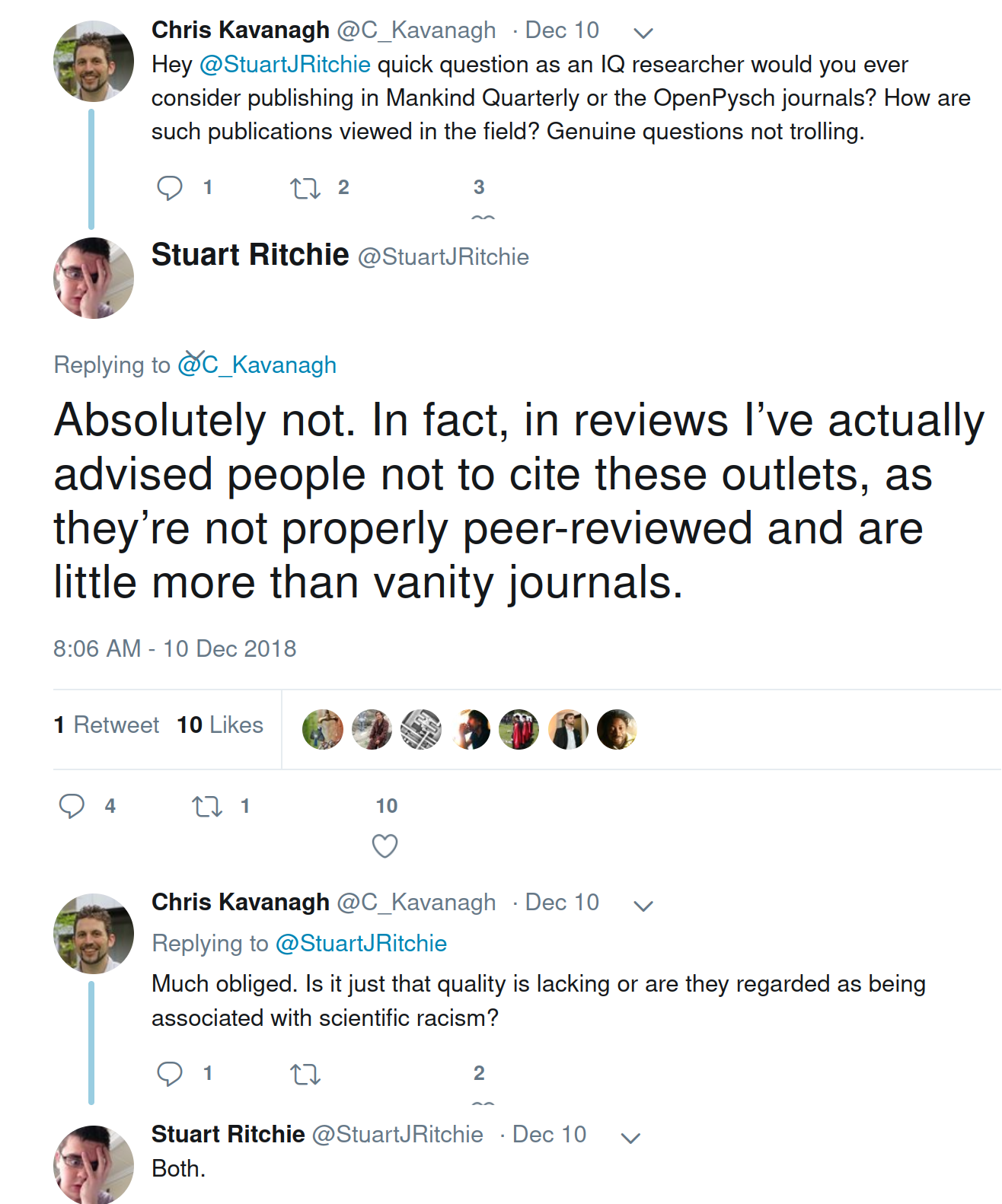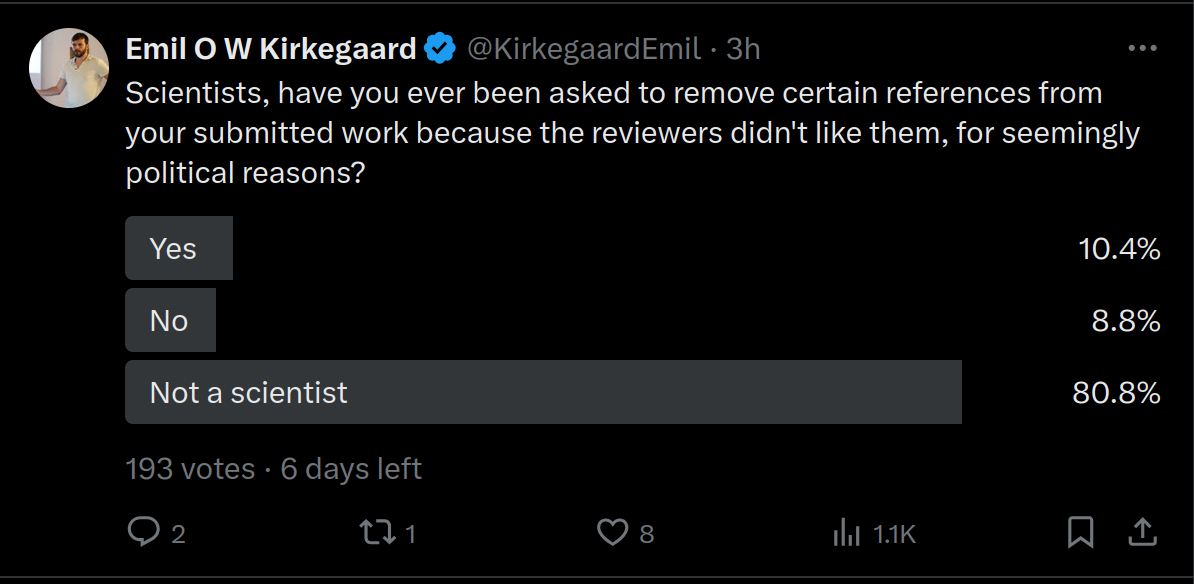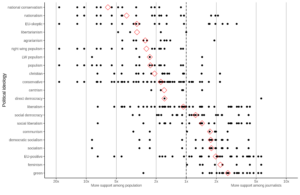There are many ways that politics impact science. Many people are aware of the extreme measures taken by Soviet Russia (Lysenkoism) in order to make genetics fit with the party line. Leftist political bias in modern science is not quite Lysenkoism, since genetics is no longer denied (and dissidents aren’t sent to gulags). Rather, the denial has been limited to certain aspects of human genetics, mainly related to behavior and any group differences (sex, ethnic/race, national/regional). Due to the hard work across decades by figures like Tom Bouchard, Robert Plomin, Ian Deary, Matt McGue, essentially all ‘within group’ analyses have lost most of their tabooness. Great progress has been made on that front, but at the cost of group differences research which seems more taboo now than ever.
Here I want to focus on a different mechanism that influences science. For better or worse, once scientists started counting papers and journals, a hierarchy emerged. Some journals publish papers that get more attention and more citations on average than over journals. This metric, average number of citations per publication, is now called the impact factor. Some corrections are needed because journals try to game the system by excluding certain kinds of publications from the count (e.g., editorials, corrections, retraction notices). As scientists’ career progression (hiring and promotion) must depend on some kind of productivity and quality measure, the journal impact factors have come to serve this social purpose. As such, there is an assumption that scientists who publish in ‘top’ generalist journals (Nature, Science etc.) and specialized journals (e.g., American Economic Review in economics) are better scientists, more worth hiring. As I’ve written before, actual objective metrics of scientific quality do not show much of a correlation to the impact factor of journals. These inconvenient findings are mostly ignored.
Because citations and the resulting journal impact factors serve as go-to social indicators of quality, one way to undermine research one doesn’t like is to prevent citations to it or to the journals that publish it, even if they also publish other unobjectionable work. This indirect reputational attack mainly works in the shadows. First, authors are free to choose what they want to cite, so they can just avoid citing critical or negative work of their own working hypothesis. This leads to critical findings being systematically under-cited, a process similar to (positivity) publication bias. Lee Jussim and colleagues have various collections showcasing this kind of citation bias. Take this example concerning sex discrimination in academic hiring (from A Model of Political Bias in Social Science Research):

It’s a head-to-head comparison of two similar studies with opposite conclusions. The 2015 study is clearly better in terms of the objective metrics (5 experiments, 873 sample size), but the 2012 study receives 7.5 times the number of citations per year. Is it a fluke? They have another collection of 4 studies finding pro-male bias, and 6 studies finding no or pro-female bias. Their citations per year were 52 vs. 9. Many more such comparisons exist, but as far as I know, there’s no systematic study of this kind yet.
These findings concern citation bias at the study-level, but what about the journal-level? Mankind Quarterly is a typical target of this kind of suppression. Not only will many authors refuse to cite any paper published in it, however relevant, but reviewers and editors may force authors to remove such citations (otherwise their work is rejected). They don’t generally say this in the open or directly, presumably because they know this is bad manners and scientifically improper. However, there are at least 2 cases I know of where they did admit to this practice in writing. First, an email sent to Heiner Rindermann from the editors of Journal of Intelligence (whose editors also openly admit to censoring certain topics):
Another example deals with the quality of the review process at the Journal of Intelligence. This author and a colleague submitted a manuscript in 2019 on an “ordinary,” “dry,” and politically neutral subject comparing the results and cognitive processes measured by psychometric IQ and Piagetian cognitive development research entitled “Piagetian tasks and psychometric intelligence: Different or similar constructs?” (Rindermann & Ackermann, 2021). We used three samples from kindergarten to primary school age, including mental speed; presented explanatory and hierarchical confirmatory factor analyses and a path analysis, along with many scatter plots; and showed correlations with parental education indicators. The main message of the study was that psychometric IQ and Piagetian cognitive development are theoretically and empirically similar constructs. There was nothing sensational about these findings.
After submission, we revised the paper in response to scholarly reviews, as required by standard academic procedures. We then received the following email:
In your previous Submission I asked you to consider that ‘The journal will not publish articles that may lead to or enhance political controversies and the editors will judge whether that is the case’ (https://www.mdpi.com/journal/jintelligence/about). Thus, please consider that I will not further consider articles with references to Mankind Quarterly. Please resubmit a version without such references.
The Mankind Quarterly paper was one by Oesterdiekhoff (2009) on “Trials against animals.” This paper is certainly one of the most informative ones on the structure- genetic sociology of how people in the past (specifically in the Middle Ages) thought in a preformal way. The paper did not address any controversial content (of course, a new “ism” could be invented, e.g., “Middle Ageism”). However, the editor applied political criteria in the selection of publications that we refer to in our literature review. She forced us to delete a reference, which we had to do in order for the manuscript to be considered for publication in the Journal of Intelligence. The use of political criteria and the strong-arming of authors regarding referred literature are violations of scientific standards.
Second, in an unusually forthright move, Stuart Ritchie admitted to doing this himself when he reviews papers. Judging from the context of the tweets (1, 2), he was trying to ‘punch right’, so that his own work would not get tainted by association:

Stuart did not want to be associated with those he terms “weirdos/obsessives”, “losers”, and “independent scholars”. Fittingly, Stuart himself is now an independent scholar. (This is too bad because Stuart is a good scientist, cowardice aside.) (Stuart is also wrong to claim them as vanity journals because neither of them charges a publication fee.)
The effect of this citation suppression is that Mankind Quarterly (and others) looks worse on that metric, and can then be attacked for being low quality because it gets few citations. A catch-22! The broader context is this:
- Institute severe political bias in academic journals.
- Contrarians then make their own journals so they can keep doing science free of censorship.
- These are then attacked, citations suppressed, so their journals look bad using the fact quality = impact factor correlation.
The most obvious escape from this angle is to keep switching journals and use preprint services. Of course, any new journal will be attacked on the same grounds. Preprints can be similarly attacked for not being peer-reviewed. Of course, no one objects to other preprints because scientists know privately that peer review is not good as a quality filter. This provides a nice example of selective enforcement of social rules regarding scientific credibility. Selective enforcement of laws is a hallmark of totalitarian regimes.
Is this common? I ran a Twitter replication just before writing this, and it seems it’s not that uncommon:

Of course, my followers are not representative, but heavily over-represented with heterodox scientists who are more likely to encounter this problem.

